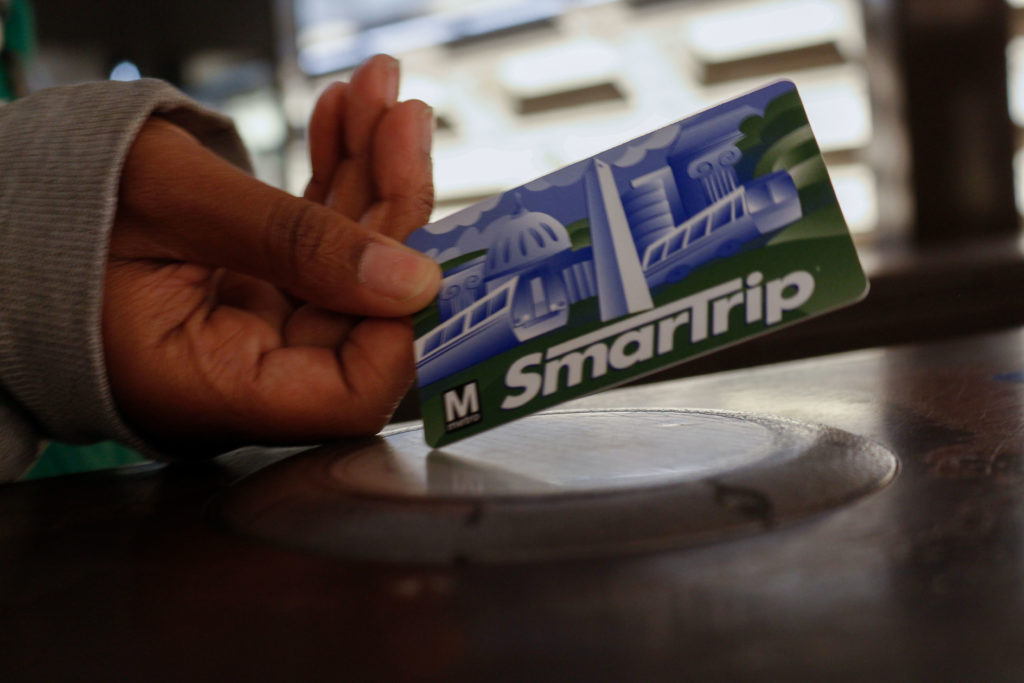Students who ride the Metro could soon see a slight hike in their train fares, according to a budget proposal released last week.
The Washington Metropolitan Area Transit Authority’s proposal released Nov. 7 suggests increasing fares by 10 cents during peak hours, eliminating the bus-to-train transfer fee and charging a flat $2 rider fee on weekends. Students said the proposed pricing increase would not hurt their budget, but the flat weekend rate would encourage them to use the Metro more often over the weekends.
Under the new proposal, which would be implemented by July 2021 if approved, Metro would expand its operating hours from 5 a.m. to midnight Monday through Thursday and operate from 7 a.m. to 2 a.m. Friday and Saturday. The trains currently run from 5 a.m. to 11:30 p.m. Monday through Thursday, 7 a.m. to 1 a.m. Saturday and 8 a.m. to 11 p.m. Sunday.
WMATA spokesman Daniel Stessel said the fare increase could result in a slight ridership drop, but added that many WMATA riders won’t see a change at all because they could avoid rush hour.
“You expect to see ridership to drop off by double-digit percentages,” he said. “There’s always an initial drop off, and this proposed fare increase is very, very modest by comparison.”
A final decision on which elements of the proposal WMATA will accept will be determined in March, according to the proposal.
Freshman Abby Cohen, a criminal justice major, said she typically rides the Metro once a month to Virginia, the Fashion Centre at Pentagon City or the Supreme Court. Cohen said she typically uses Uber if she’s traveling in a radius of two miles around campus.
“I honestly don’t think a small increase in the price would impact me in any way since I do not ride it often,” Cohen said. “The transfer fee being eliminated will definitely be nice for the times I do ride though.”
Freshman Micah Cohn said she rides the Metro two to three times per month to visit friends and family in Virginia. She said the current Metro fare is affordable for her, and the fare with the 10 cent hike would still be cheaper than Uber and Lyft rides.
She added that she would take advantage of the $2 weekend rate on weekends at night if the Metro extended its late-night hours.
“I don’t really think about the transfer fee since I mostly just expect the price to be in a $2 to $5 range, and don’t really think about the exact price,” Cohn said.
Mayor Muriel Bowser pushed last month for WMATA to include late-night hours in its budget proposal, which students said would encourage them to get off campus more often during the weekends.
Freshman Jami Ellen, who majors in political science, said she usually walks or calls an Uber to get around D.C., but nixing the transfer fee would incentivize her to use the service more frequently on weekends.
“I assume it would incline others to do the same because the elimination of that fee makes the Metro more financially accessible to all,” Ellen said.
Freshman Kylie Foster, a public health major, said she frequently rides the Metro on weekends to visit her sister at Howard University. Foster said she typically opts for the Metro because the train is cheaper and more environmentally friendly than options like Uber or Lyft.
Foster said she rides the Metro about twice per week to visit her sister, and the 10 cent fare hike wouldn’t pose a financial burden. She said she supports eliminating the transfer fee because it would relieve a financial burden for low-income Metro users.
“I know other professors, students and employees on our campus that rely on the Metro daily, so for them, I can only imagine how the 10 cent increase will affect them,” Foster said.
Chanler Miller and Lia DeGroot contributed reporting.





